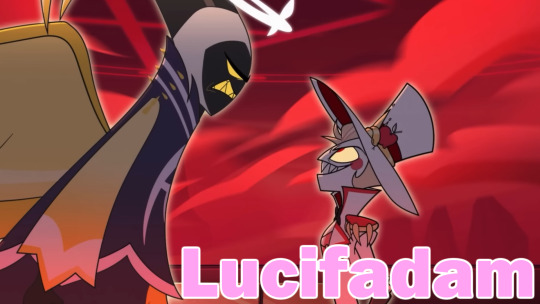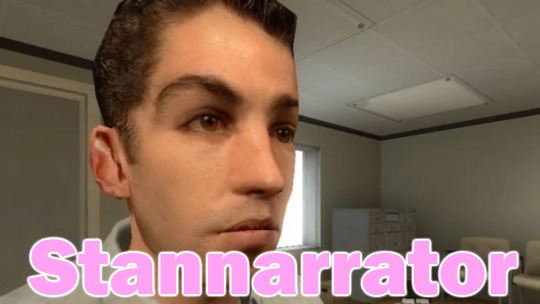#how he acts in the original mod vs how he acts in the ultra deluxe
Text
Realized how often the Narrator anthropomorphizes things in the Ultra Deluxe in order to encourage or bait Stanley. Which is so much different than how he was in the past endings, specifically the apartment ending. The way he now refers to all the different quotable and memorable objects in the game as Stanley’s friends.

There’s just something about the way the Narrator does at least deeply try to relate to Stanley’s need as a human, understanding more that we are sociable creatures. Giving us the bucket as something to cherish and playing along with the notion (despite getting very obviously upset when Stanley gets too attached to the bucket and then tries to break down that narrative). The attempt made to actually reach out to Stanley in a human-like way.
I don’t know where I’m going with this but the attempt at connection through the similar actions of a person or something like that. Acknowledgement of human needs, even if it's more or less the bare minimum effort.
#the stanley parable#there’s just something about the change in the narrator as a character through the various editions of the game#how he acts in the original mod vs how he acts in the ultra deluxe#again this falls all the way into my whole the narrator acting more human as time goes on#and stanley becomes less human as time goes on concept i got brewing in my head at all times#sorry I’m always so chatty about this game btw I feel like I may be too annoying with it#if I am plz know that I’m sorry for it. fixation’s insane with this one#the stanley parable ultra deluxe#<- technically ig#edit: edited it just a smidge hehe#my friend brought up a good point and I wanted to add it :-)
315 notes
·
View notes
Text


Antis DNI - Block the tag "comship" if this causes discomfort.
Remember, you are voting for the ship you prefer, not the ship you find more problematic
Propaganda for both ships under the cut.
Disclaimer: All ships (other than the now-eliminated NozoCoco) on this bracket are FOLLOWER-SUBMITTED ships, the Mods do not always hold necessary knowledge to be aware of any errors or fanonizing what should be canon material that may arise.
Lucifadam Propaganda (Harmful Dynamic)
"Lucifer is a fallen angel while Adam is still an angel, leading an army of exorcists that slaughters Lucifer's people annually. He's constantly killing demons, and Lucifer has basically given up trying to prevent this after several attempts. However, he has that protective fire reignited in him when Adam decides to go after Lucifer's daughter - and Lucifer makes a comment that many take in a more suggestive fashion than Lucifer intended. They're SO unhealthy for each other, but that one comment eliciting that kind of reaction sparked fun ideas for their ship in my head, so I wanted to submit these two together."
Stannarrator Propaganda (Codependency, Toxic Power Dynamics - In most endings)
"The Stanley Parable is a game about The Narrator wanting to tell a story through their game but having to rely on the Stanley's choices. The core of the game is that Stanley and The Narrator are bound to each other: Stanley needs The Narrator to make the "parable" he lives in, and The Narrator needs Stanley to make the choices that drive the story.
The Narrator clearly has the most power in this dynamic, since he can alter the world the Stanley lives in: modifying the rooms, creating and deleting objects at will, reloading the game, altering Stanley's perception, knowing almost everything and being almost everywhere. But, despite all that power, he isn't able to control the one thing that keeps his story existing: Stanley's choices.
Okay, spoilers to both the original 2013 game and the Ultra Deluxe remake from here on out since it's impossible to talk about them without spoiling a lot of the endings.
In one of the new endings on the Ultra Deluxe remake, the Skip Button ending, The Narrator creates a button that lets Stanley skip his dialogue `inspired` by a bad Steam review, but when Stanley clicks this button The Narrator is left all alone in that room, and which each click the skip becomes longer, from minutes, to hours, to weeks, to months… And in the fifth skip (where Stanley stays frozen for like, one, two weeks), The Narrator breaks up, talking about how he needs Stanley to listen to him and how scared he is of slipping back into the silence he passes through every time we use the skip button. In his own words, `I can't lose myself in the stretch of emptiness between you and me.` Of course, since it's the only way to advance in this ending, we skip again, and again, until The Narrator ends up eventually disappearing after the 12th or 13th skip, leaving Stanley alone in a desert, and that's where the ending stops, though it continues on the Epilogue, but I'll leave some things to add as propaganda during the polls.
Despite this, The Narrator still has more control of the situation than Stanley, like on the Explosion ending, where he traps Stanley in a room while the building's destroys itself as consequence for choosing to activate the Mind Control Machine instead of shutting it down to free everyone. He keeps acting like Stanley is nothing but a vehicle for him to pass a message through his story. `Watching you try to make sense of everything and take back the control wrested away from you…it's quite rich. I almost hate to see it go!` `You're only still playing instead of watching a cutscene because I want to watch you for every moment that you're powerless, to see you made humble. […] You wanted to control this world; that's fine. But I'm going to destroy it first, so you can't.`
But there's one point where they're equal, they both want to free themselves. On the Museum ending, we meet a being that is higher than The Narrator, the Female Narrator (yeah, that's her name), and she gives the best description of the relationship between these two: `Oh, look at these two. How they wish to destroy one another. How they wish to control one another. How they both wish to be free. Can you see? Can you see how much they need one another? No, perhaps not. Sometimes these things cannot be seen.`"
#comshipbracket#antis dni#antis do not interact#comship#comship safe#proship safe#comship bracket#comshipbracket3#comshipbracket 3#comship bracket 3#comshipbracket3 round 2#comshipbracket 3 round 2#comship bracket 3 round 2#Lucifadam#Lucifer Morningstar#Adam Hazbin Hotel#Lucifer Hazbin Hotel#Hazbin Hotel#Stannarrator#Stanley TSP#The Narrator TSP#The Stanley Parable#Stanley Parable#TSP
5 notes
·
View notes